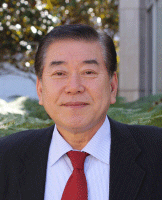Chung-in Moon, Professor of Political Science, Yonsei University
What is South Korea’s perception of China’s rise? How has China’s rise influenced its interactions with the two Koreas as well as the ROK-US alliance? What is South Korea’s most ideal strategic choice? Balancing, bandwagoning, standing alone, or shaping a new regional order? What implications might these options have on the future of Korean peninsula?
Chung-in Moon is a professor of political science at Yonsei University and Editor-in-Chief of Global Asia, a quarterly magazine in English. He is also Director of the Kim Dae-jung Presidential Library and Museum. He served as Chairman of the Presidential Committee on Northeast Asian Cooperation Initiative, a cabinet-level post, and Ambassador for International Security Affairs at the Ministry of Foreign Affairs and Trade, the Republic of Korea. He has published over 45 books and 250 articles in edited volumes and such scholarly journals. His recent publications include What Does Japan Now Think? (in Korean, 2013), The Sunshine Policy-In Defense of Engagement as a Path to Peace in Korea (2012), Exploring the Future of China (in Korean 2010 and Chinese in 2012), The United States and Northeast Asia: Debates, Issues, and New Order (with John Ikenberry 2008), and War and Peace in East Asia (2006). He attended the 1st and 2nd Pyongyang Korean summit as a special delegate. He is a recipient of Public Policy Scholar Award (the Woodrow Wilson International Center in Washington, D.C.), the Lixian Scholar Award (Beijing University), and the Pacific Leadership Fellowship (UCSD). He served as the President of the Korea Peace Research Association and Vice President of the International Studies Association (ISA) of North America. He is a member of ASEAN Regional Forum-Eminent and Expert Persons (ARF-EEPs) representing South Korea and served as co-chair of the first and second AFR-EEPs meetings in June 2006 and February 2007.
cks@berkeley.edu, 510-642-5674

